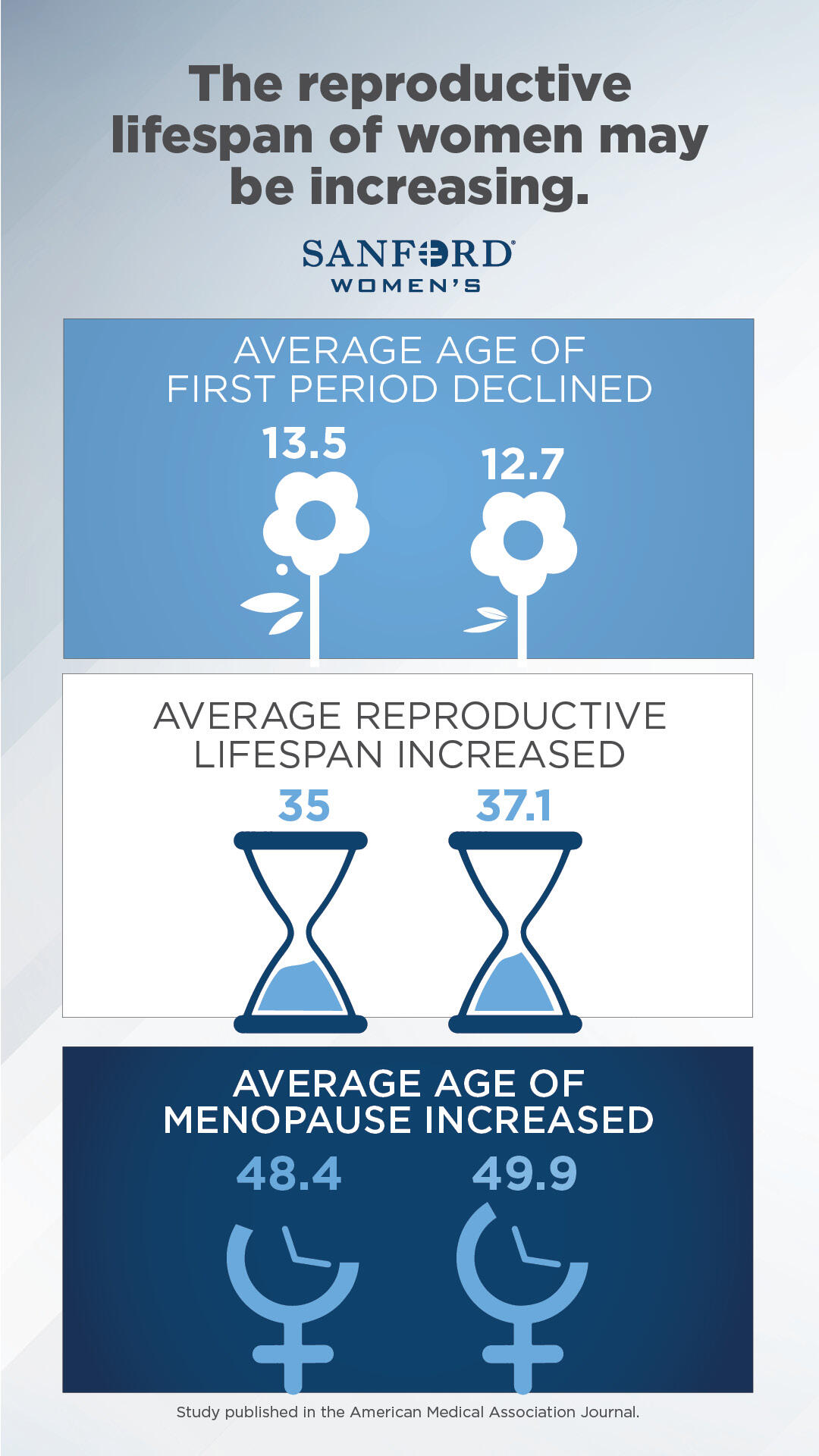A new study indicates that the reproductive years for women in the U.S. may be increasing.
The study, published in the Journal of the American Medical Association, analyzed trends in age at natural menopause and reproductive life span for six decades.
Researchers found that the average age of menopause had increased from 48.4 to 49.9, while the average age of a woman’s first period had decreased from 13.5 to 12.7. In addition, the study showed an increase in women’s reproductive life spans, from 35 to 37.1 years.

Infographic by Megan Ringling, Sanford Health
What is a reproductive life span?
A woman’s reproductive life span begins at menarche, or a woman’s first period, and ends at menopause.
Certified nurse-midwife Ashley Geraets specializes in women’s health. She defines a reproductive life span as the “age at which someone starts having their period to when they stop having their periods.”
Find a doctor: Women’s health specialists at Sanford Health
Reproductive life spans can vary widely among women. Abrea Roark, OB/GYN, says it’s normal to be different from your friends.
“Some women will go through menopause earlier. Some women will go through menopause later, all along with the bell-shaped curve,” she said. “I spend my days telling women that this is normal to get your period when you’re, say 11, even though some of your friends don’t get it.”
These life stages are affected by many factors, like genetics, ethnicity and overall nutrition.
“It’s very much generational, and we also see a difference in ethnicity,” Dr. Roark said.
“If you’re healthier overall, your fertility or your ability to maintain your reproductive health is affected,” Geraets said.
Why does it matter?
Nurse practitioner Allison Harrison says most women want to know when they’ll be able to become pregnant. That’s where understanding your reproductive life span comes in.
“A lot of people want to know: ‘What are the years that I’ll be able to have a child?’”
For years, medical professionals have used age 35 as a guideline for when it becomes more difficult for women to have or sustain a pregnancy.
“We know throughout our entire life that our eggs are depleting,” Harrison said. “Once we see over age 35, we know that it can be a little bit harder to achieve a pregnancy.”
Data from the new study shows that number may be increasing slightly. Harrison and other providers said that with more information, the study could lead to changes in future guidelines for women.
“I think this study is telling us that we’re seeing some change,” she said. “We’ve definitely seen earlier menstrual cycles in young women.”
Both Geraets and Harrison agree that as more data on the subject is shared, there may be changes in clinical recommendations from providers.
“I don’t think that this study at this point is going to change anything, but it is definitely something that we will probably continue to study,” she said. “If it continues to show longer reproductive years, it may be something where we need to consider different screening guidelines.”
Later pregnancy can lead to complications
Studies like these are becoming more important as more women choose to become pregnant later in life. Harrison and other providers, like Dr. Roark, have noticed a trend in later pregnancies through their work.
“In the Midwest, I feel like we still have a lot of the women starting families young, but nationwide, we definitely see women starting their family in their early- to mid-30s,” Dr. Roark said. “I’ve had several patients over the age of 40 currently pregnant.”
Health care experts generally advise to pay extra attention with later pregnancies, as they can carry a greater chance of complications for mom and baby.
“We know that as we get older, our eggs maybe aren’t as healthy for lack of better terms,” Harrison said. “With that comes higher rates of genetic abnormalities, higher rates of miscarriage, and then issues during the pregnancy, such as high blood pressure, pre-term deliveries and higher rates of stillbirth.”
Around age 35, Harrison said it’s a good idea to seek help from medical providers if you haven’t been able to achieve a pregnancy after 6 months of trying.
“That’s when we like to have people reach out to us if they’re having a hard time getting pregnant, because we know that their years where they can actually have a baby with their own eggs is probably getting much shorter than someone who is 21 and trying to achieve a pregnancy.”
Learn more
- Helpful information on pregnancy after age 35
- Mental health care supports patients on fertility journey
- Girls and puberty: It’s about more than their first period
…
Posted In Fargo, Gynecology, Menopause Care, Pregnancy, Sioux Falls, Women's, Worthington
